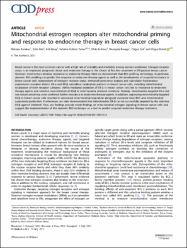| dc.contributor.author | Karakaş, Bahriye | |
| dc.contributor.author | Aka, Yeliz | |
| dc.contributor.author | Giray, Aslı | |
| dc.contributor.author | Temel, Şehime Gülsün | |
| dc.contributor.author | Açıkbaş, Ufuk | |
| dc.contributor.author | Başağa, Hüveyda | |
| dc.date.accessioned | 2022-09-23T14:00:17Z | |
| dc.date.available | 2022-09-23T14:00:17Z | |
| dc.date.issued | 2021 | en_US |
| dc.identifier.uri | https://hdl.handle.net/20.500.12868/1671 | |
| dc.description.abstract | Breast cancer is the most common cancer with a high rate of mortality and morbidity among women worldwide. Estrogen receptor status is an important prognostic factor and endocrine therapy is the choice of first-line treatment in ER-positive breast cancer. However, most tumors develop resistance to endocrine therapy. Here we demonstrate that BH3 profiling technology, in particular, dynamic BH3 profiling can predict the response to endocrine therapy agents as well as the development of acquired resistance in breast cancer cells independent of estrogen receptor status. Immunofluorescence analysis and subcellular fractionation experiments revealed distinct ER-alpha and ER-beta subcellular localization patterns in breast cancer cells, including mitochondrial localization of both receptor subtypes. shRNA-mediated depletion of ER-beta in breast cancer cells led to resistance to endocrine therapy agents and selective reconstitution of ER-beta in mitochondria restored sensitivity. Notably, mitochondria-targeted ER-alpha did not restore sensitivity, even conferred further resistance to endocrine therapy agents. In addition, expressing mitochondria-targeted ER-beta in breast cancer cells resulted in decreased mitochondrial respiration alongside increased total ROS and mitochondrial superoxide production. Furthermore, our data demonstrated that mitochondrial ER-beta can be successfully targeted by the selective ER-beta agonist Erteberel. Thus, our findings provide novel findings on mitochondrial estrogen signaling in breast cancer cells and suggest the implementation of the dynamic BH3 technique as a tool to predict acquired endocrine therapy resistance. | en_US |
| dc.language.iso | eng | en_US |
| dc.relation.isversionof | 10.1038/s41420-021-00573-2 | en_US |
| dc.rights | info:eu-repo/semantics/openAccess | en_US |
| dc.subject | Er-Alpha | en_US |
| dc.subject | Beta | en_US |
| dc.subject | Expression | en_US |
| dc.subject | Growth | en_US |
| dc.subject | Localization | en_US |
| dc.title | Mitochondrial estrogen receptors alter mitochondrial priming and response to endocrine therapy in breast cancer cells | en_US |
| dc.type | article | en_US |
| dc.contributor.department | ALKÜ, Fakülteler, Rafet Kayış Mühendislik Fakültesi, Genetik ve Biyomühendislik Bölümü | en_US |
| dc.identifier.volume | 7 | en_US |
| dc.identifier.issue | 1 | en_US |
| dc.relation.journal | Cell Death Discovery | en_US |
| dc.relation.publicationcategory | Makale - Uluslararası Hakemli Dergi - Kurum Öğretim Elemanı | en_US |


















